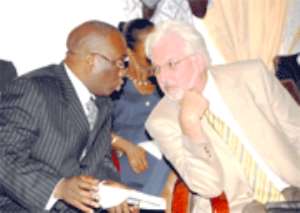
High Commissioners of the European Union (EU) in Ghana are assessing the country's judicial system to ensure transparency in the administration of justice and promotion of good governance.
As a prelude to the exercise, an 11-member delegation led by the German Ambassador to Ghana, Mr Peter Linder, yesterday in Accra, embarked on a familiarisation tour of some institutions involved in the administration of justice in Ghana.
The visit will enable the delegation to obtain first-hand information about how the operations of the institutions involved contribute to the administration of justice in the country and, if necessary, offer suggestions for their efficient operations.
The delegation first visited the Attorney-General's Department where the Attorney-General and Minister of Justice, Mr Joe Ghartey, briefed them about the activities and functions of the department.
Mr Ghartey said the Attorney-General was the principal legal advisor to the government and also initiated and conducted the prosecution of criminal offences, among other things.
He said the judicial system had not adequately handled the issue of mob justice. Nonetheless, he stated that a committee had been constituted and was working to bring out measures to address the problem of mob justice in the country.
Mr Ghartey said inadequate infrastructure and personnel in the regions presented a distortion in the judicial system.
Representatives of the various subvented agencies, including the Law Reform Commission, Serious Fraud Office and the Legal Aid Board, all under the Ministry of Justice, briefed the delegation on their objectives.
At the Supreme Court, the acting Chief Justice, Mr Justice Francis Yaonansu Kpegah, said the country had made significant progress in stabilising the independence of the Judiciary and bringing the administration of justice to the doorstep of the people.
Currently, he said, Ghana was enjoying the fruit of democracy on an unprecedented scale.
“It is a fact that the rule of law is working and we as the guardians of the Constitution are ensuring that it works,” he stated.
He, however, explained that the Judiciary could not have chalked up the successes without the support of the government of Ghana and non-governmental organisations (NGOs), such as the Danish International Development Agency, (DANIDA) and the German Technical Co-operation (GTZ).
Mr Justice Kpegah stated that with the computerisation of the court system, the Fast Track Court handled cases with great efficiency, adding that cases now took one-third of the time it hitherto took to be disposed of.
“We now have commercial courts which operate effectively, with computerisation of the High Courts and a few selected district courts,” he said.
He said some of the judges enjoyed sponsorship from development partners in addition to the country's own occasional domestic training programmes under the auspices of the Judicial Training Institute.
Mrs Justice Georgina Wood, who has been nominated as the Chief Justice, said although the Constitution recognised the Chieftaincy Law as part of the laws of Ghana, chieftaincy tribunals adjudicated only on matters relating to chieftaincy.
She said the justice delivery system was a chain and that delay at any stage hindered the trial of cases.
A Court of Appeal Judge, Mr Justice S.K. Manful-Sau, who is the co-ordinator of the Commercial Court Division of the High Court, said the court was specifically established to handle cases relating to the business sector.
Story by Maria Alberta Viala




 CODEO deploys 195 observers to monitor EC’s limited registration exercise nation...
CODEO deploys 195 observers to monitor EC’s limited registration exercise nation...
 Accra 2023: Minority demands accountability of $240million expenditure
Accra 2023: Minority demands accountability of $240million expenditure
 Man sets himself ablaze after failed attempt to kill his wife
Man sets himself ablaze after failed attempt to kill his wife
 EC targets 622,000 new voters in limited registration exercise
EC targets 622,000 new voters in limited registration exercise
 Election 2024: Mahama holds 19% lead over Bawumia among first-time voters — Glob...
Election 2024: Mahama holds 19% lead over Bawumia among first-time voters — Glob...
 Saglemi: Tenants’ Union threaten court suit against private partnership
Saglemi: Tenants’ Union threaten court suit against private partnership
 We've reduced the suffering Mahama left you – Bawumia to Ghanaians
We've reduced the suffering Mahama left you – Bawumia to Ghanaians
 It's still true, FX rate will expose weak economic fundamentals; cedi far better...
It's still true, FX rate will expose weak economic fundamentals; cedi far better...
 'I'm up to the task, competent, trustworthy, hardworking' – Bawumia
'I'm up to the task, competent, trustworthy, hardworking' – Bawumia
 EC begins nationwide limited voter registration exercise today
EC begins nationwide limited voter registration exercise today
